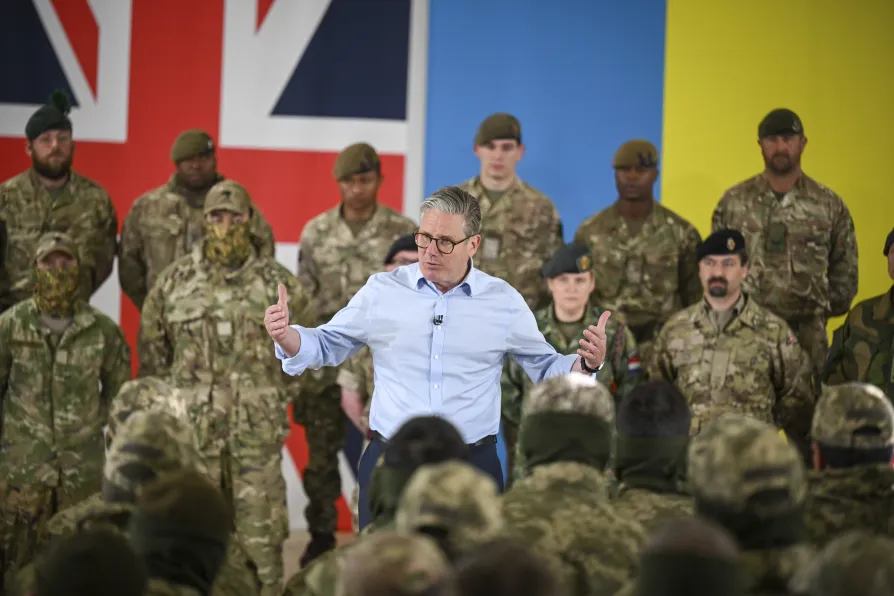
 Britain's Prime Minister Keir Starmer (centre) speaks to troops during a visit to a military base training Ukrainian troops with New Zealand's Prime Minister Christopher Luxon, in the west of England, April 22, 2025
Britain's Prime Minister Keir Starmer (centre) speaks to troops during a visit to a military base training Ukrainian troops with New Zealand's Prime Minister Christopher Luxon, in the west of England, April 22, 2025
PEACE at last appears to be a possibility in Ukraine. The proposals advanced by the Trump administration are surely a basis for negotiating an end to the conflict that has cost hundreds of thousands of lives, both military and civilian and wreaked untold destruction in Ukraine itself, while ratcheting up international tension.
Clearly, US President Donald Trump has his own interests at the forefront of his considerations in presenting the plan. He is not a peace-monger by any means, and there should be no illusions reading his motivations.
He wishes to lay exclusive hold of Ukraine’s mineral and other resources while also striking profitable deals with Russian President Vladimir Putin’s oligarchy in Russia, all in the interests of US monopoly capital.
However, the plan itself corresponds to what most of the world has been urging for years past.
First, Ukraine’s membership of Nato is categorically ruled out. Nato expansion up to Russia’s borders has undoubtedly been one of the causes of the conflict — indeed, Nato powers have been waging a “proxy war” through the medium of Ukraine throughout.
Second, there should be an enduring ceasefire broadly along the existing military lines, which have not shifted much for more than two years.
While Russia presently holds a military advantage, most of the land it currently occupies it secured in the first weeks after the 2022 invasion and has made only incremental advances since, alongside larger losses in the latter part of 2022.
Ukraine’s much-vaunted Nato-organised offensive in 2023 failed to achieve any of its objectives.
This proposal involves Putin abandoning his demand, never likely to be met, of controlling those parts of the Donetsk, Kherson and Zaporizhzhia provinces which he claims but his military has not been able to win.
These territories, and Luhansk, will likely exist in a form of international legal limbo. Ideally, the peoples themselves, including refugees, should eventually determine their status, but clearly the conditions for an expression of democratic will do not presently exist.
Third, Crimea, which Moscow annexed in 2014, should be recognised as Russian territory. Unlawful as Putin’s annexation was, it was scarcely more arbitrary than the peninsula’s transfer to Ukraine from Russia within the USSR in 1954, and its present disposition surely corresponds to the wishes of most of its population.
Sanctions which have damaged third parties and the international economy more than they have affected Russia’s economy will also be lifted under the US proposals.
Clearly, Keir Starmer opposes any moves towards a resolution, preferring public scare-mongering while prolonging the war in pursuit of unattainable objectives.
He still seeks to deploy British and French troops to Ukraine, but insists on US support for such an expedition, since British troops can scarcely operate at scale without Washington’s logistical, communications and intelligence control.
This would introduce Nato into Ukraine in all but name, a manoeuvre Moscow has said it will never accept.
Trump appears uninterested in such guarantees, preferring to get on with looting Ukraine’s economy. His senior envoys pulled the plug on PM Keir Starmer’s war summit in London this week by the simple expedient of not attending.
It is time for Starmer to drop his war-mongering, which threatens any peace deal, sustains irrational Ukrainian belligerence, and is a significant drain on British resources to boot.
Security for Ukraine and Russia can only be secured by a lasting agreement between the two countries themselves, in the context of Europe-wide arrangements which offer security to all by threatening none.
It is past time that Starmer and British diplomacy got out of the way and gave peace a chance. His militaristic posturing, all of a piece with his indulgence of the Gaza genocide, disgraces Labour.












